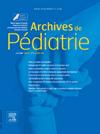Eating disorders in children under 4 years of age with autism spectrum disorder: Description and determinants
IF 1.3
4区 医学
Q3 PEDIATRICS
引用次数: 0
Abstract
Background
Eating disorders in children with autism spectrum disorder (ASD) are multifactorial and complex, and impair their quality of life. The link between eating difficulties and ASD is still controversial, and few studies have focused on very young children with ASD.
Objectives
Our objectives were: 1) to characterize the eating disorders of ASD children under 4 years; 2) to study the links between these eating disorders and the characteristics of the child (symptoms and severity of ASD, level of development).
Methods
33 ASD children (18 months to 4 years) were included. Their developmental level was assessed by the Brunet-Lézine Revised test (BL-R) and characteristics of ASD by the Autism Diagnosis Interview-Revised (ADI-R). We used a new questionnaire on eating disorders of children between 9 months and 6 years of age that covered 4 dimensions: eating behavior, oro-motor skills, oral and bodily sensory characteristics, and parental impacts and strategies.
Results
70 % of parents declared eating disorders in their child, with an early frequent onset beyond 12 months of age. These disorders caused significant parental suffering and worries about the future in two-thirds of parents, and more than half of the parents implemented strategies to handle them. We found two striking results: 1) No statistical link was observed between the severity of an eating disorder and the severity of ASD symptoms or the child's developmental level; 2) Children with better communication and socialization levels had more eating disorders.
Conclusion
These results show that eating disorders in our population are probably linked with the relational nature of the act of eating.
4岁以下自闭症谱系障碍儿童的饮食失调:描述和决定因素
背景自闭症谱系障碍(ASD)儿童的进食障碍是多因素和复杂的,并影响其生活质量。饮食困难和自闭症之间的联系仍然存在争议,很少有研究关注非常年幼的自闭症儿童。我们的目标是:1)描述4岁以下ASD儿童饮食失调的特征;2)研究这些饮食失调与儿童特征(ASD的症状和严重程度、发育水平)之间的联系。方法选取ASD患儿33例(18个月~ 4岁)。采用布鲁内特-莱姆齐修正测验(BL-R)评估其发育水平,采用自闭症诊断访谈修正测验(ADI-R)评估其ASD特征。我们使用了一份关于9个月至6岁儿童饮食失调的新问卷,涵盖了4个方面:饮食行为、口腔运动技能、口腔和身体感官特征以及父母的影响和策略。结果70%的父母报告他们的孩子有饮食失调,且早发频率超过12个月。这些障碍给三分之二的父母带来了巨大的痛苦和对未来的担忧,超过一半的父母采取了应对策略。我们发现了两个惊人的结果:1)饮食失调的严重程度与ASD症状的严重程度或儿童的发育水平之间没有统计学上的联系;2)交际、社交水平越高的儿童饮食失调发生率越高。结论这些结果表明,我们人群中的饮食失调可能与饮食行为的关系性质有关。
本文章由计算机程序翻译,如有差异,请以英文原文为准。
求助全文
约1分钟内获得全文
求助全文
来源期刊

Archives De Pediatrie
医学-小儿科
CiteScore
2.80
自引率
5.60%
发文量
106
审稿时长
24.1 weeks
期刊介绍:
Archives de Pédiatrie publishes in English original Research papers, Review articles, Short communications, Practice guidelines, Editorials and Letters in all fields relevant to pediatrics.
Eight issues of Archives de Pédiatrie are released annually, as well as supplementary and special editions to complete these regular issues.
All manuscripts submitted to the journal are subjected to peer review by international experts, and must:
Be written in excellent English, clear and easy to understand, precise and concise;
Bring new, interesting, valid information - and improve clinical care or guide future research;
Be solely the work of the author(s) stated;
Not have been previously published elsewhere and not be under consideration by another journal;
Be in accordance with the journal''s Guide for Authors'' instructions: manuscripts that fail to comply with these rules may be returned to the authors without being reviewed.
Under no circumstances does the journal guarantee publication before the editorial board makes its final decision.
Archives de Pédiatrie is the official publication of the French Society of Pediatrics.
 求助内容:
求助内容: 应助结果提醒方式:
应助结果提醒方式:


